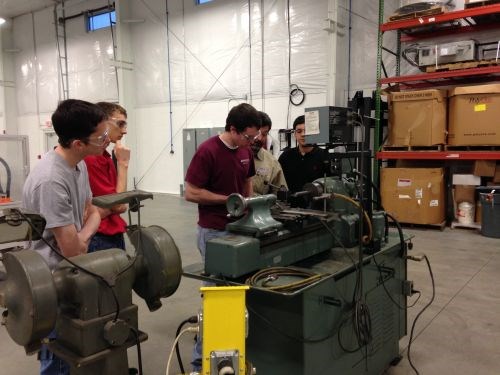An Age-Old Solution to the Skills Shortage
One group of North Carolina manufacturers has been reaping the rewards of European-style apprenticeships for nearly 20 years. Now, another group is hoping to replicate their success.

As members of Apprenticeship 2000 and NCTAP, respectively, both Ameritech Die and Mold and Superior Tooling conduct hands-on orientation sessions to evaluate students' aptitude for summer internships—and eventually, full apprenticeships. Here, students learn the ropes of turning at Superior Tooling. Learn more.
The average age of employees at Ameritech Die and Mold is about 28. Whenever the company makes a significant change to processes, equipment or software, the Mooresville, North Carolina mold manufacturer’s younger workers “don’t even bat an eye,” says Steve Rotman, company president. Notably, that’s not just because they’re young enough to not be set in their ways. They also have the skills needed to master todays’ computerized manufacturing technology—and as much as 10 years of shopfloor experience under their belts.
That’s because many started at the shop while still in high school as part of Apprenticeship 2000, a Charlotte-area organization that Ameritech has been part of since the mid ‘90s. This workforce development program is based heavily on a structure used in countries like Germany and Switzerland since the Middle Ages.
Now, that model is spreading to another portion of the state, where another mold shop and six other manufacturers hope to realize the same benefits as Ameritech. The North Carolina Triangle Apprenticeship Program (NCTAP) will formally accept its first apprentices this fall under the watchful eye of Apprenticeship 2000, which is serving in an advisory capacity as the new organization gets off the ground. To learn more, check out this article covering the origins and structure of NCTAP through the lens of Wake Forest-based mold manufacturer Superior Tooling. Meanwhile, this Q&A with Rotman sheds light on his experience with Apprenticeship 2000.
Related Content
-
MMT Chats: Giving Back by Answering the Moldmaking Education Need
MoldMaking Technology Editorial Director Christina Fuges checks in with Bruce Cateon, an executive advisor at OASIC Consulting. Bruce started out in moldmaking, eventually becoming an industry consultant and taking time to work on his passion project the “Injection Mold Design Handbook” as a way of giving back to the industry that has given him so much. This episode is brought to you by ISCAR with New Ideas for Machining Intelligently.
-
How to Improve Your Current Efficiency Rate
An alternative approach to taking on more EDM-intensive work when technology and personnel investment is not an option.
-
Leading Mold Manufacturers Share Best Practices for Improving Efficiency
Precise Tooling Solutions, X-Cell Tool and Mold, M&M Tool and Mold, Ameritech Die & Mold, and Cavalier Tool & Manufacturing, sit down for a fast-paced Q&A focused on strategies for improving efficiencies across their operations.













